Comprehensive Analysis of BBC's Organizational Behaviour: A Report
VerifiedAdded on 2020/07/22
|14
|4377
|41
Report
AI Summary
This report provides a comprehensive analysis of the BBC's organizational behaviour, examining its historical and present-day culture, power dynamics, and political influences. The report delves into the earlier power-based culture and its impact, as well as the positive and negative aspects of power and politics within the organization. It also explores motivational theories, including Herzberg's Motivation-Hygiene Theory and Maslow's Hierarchy of Needs, and their application in the BBC context. Furthermore, the report discusses various motivational tools and their effectiveness, along with an assessment of different team types and strategies for building effective teams. The study also addresses approaches to improve productivity and performance, and barriers affecting effective performance within the BBC, offering valuable insights into the organization's operational dynamics and management strategies.
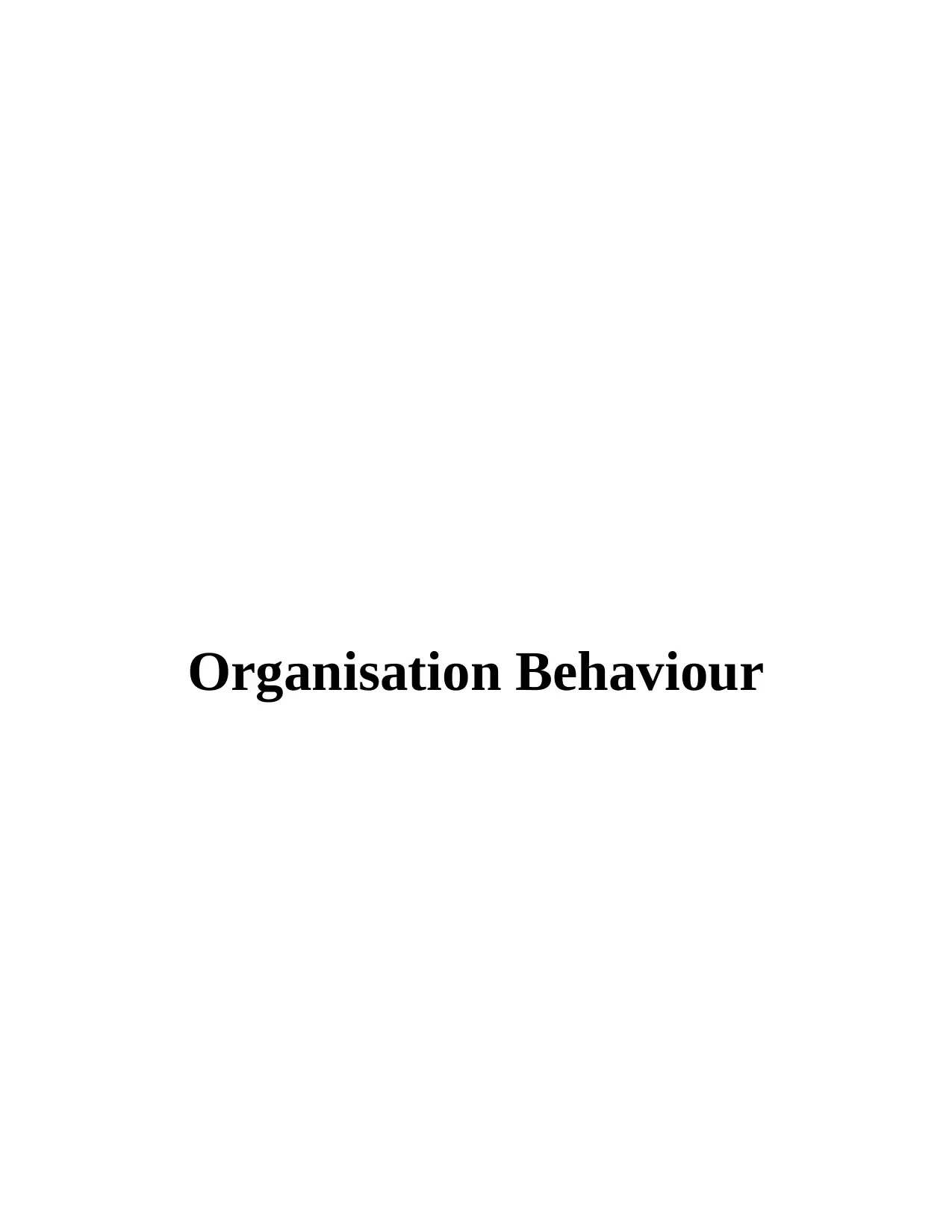
Organisation Behaviour
Paraphrase This Document
Need a fresh take? Get an instant paraphrase of this document with our AI Paraphraser
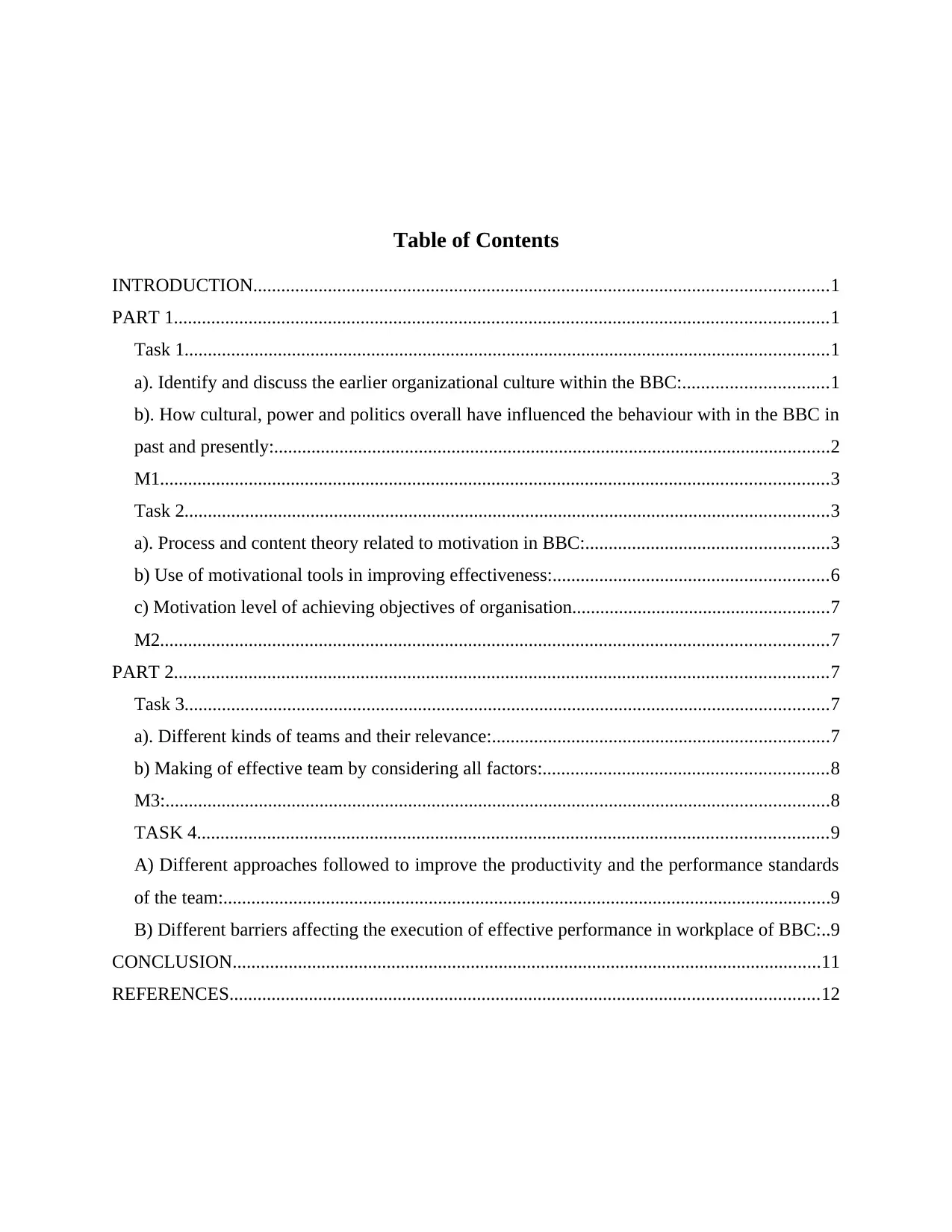
Table of Contents
INTRODUCTION...........................................................................................................................1
PART 1............................................................................................................................................1
Task 1..........................................................................................................................................1
a). Identify and discuss the earlier organizational culture within the BBC:...............................1
b). How cultural, power and politics overall have influenced the behaviour with in the BBC in
past and presently:.......................................................................................................................2
M1...............................................................................................................................................3
Task 2..........................................................................................................................................3
a). Process and content theory related to motivation in BBC:....................................................3
b) Use of motivational tools in improving effectiveness:...........................................................6
c) Motivation level of achieving objectives of organisation.......................................................7
M2...............................................................................................................................................7
PART 2............................................................................................................................................7
Task 3..........................................................................................................................................7
a). Different kinds of teams and their relevance:........................................................................7
b) Making of effective team by considering all factors:.............................................................8
M3:..............................................................................................................................................8
TASK 4.......................................................................................................................................9
A) Different approaches followed to improve the productivity and the performance standards
of the team:..................................................................................................................................9
B) Different barriers affecting the execution of effective performance in workplace of BBC:..9
CONCLUSION..............................................................................................................................11
REFERENCES..............................................................................................................................12
INTRODUCTION...........................................................................................................................1
PART 1............................................................................................................................................1
Task 1..........................................................................................................................................1
a). Identify and discuss the earlier organizational culture within the BBC:...............................1
b). How cultural, power and politics overall have influenced the behaviour with in the BBC in
past and presently:.......................................................................................................................2
M1...............................................................................................................................................3
Task 2..........................................................................................................................................3
a). Process and content theory related to motivation in BBC:....................................................3
b) Use of motivational tools in improving effectiveness:...........................................................6
c) Motivation level of achieving objectives of organisation.......................................................7
M2...............................................................................................................................................7
PART 2............................................................................................................................................7
Task 3..........................................................................................................................................7
a). Different kinds of teams and their relevance:........................................................................7
b) Making of effective team by considering all factors:.............................................................8
M3:..............................................................................................................................................8
TASK 4.......................................................................................................................................9
A) Different approaches followed to improve the productivity and the performance standards
of the team:..................................................................................................................................9
B) Different barriers affecting the execution of effective performance in workplace of BBC:..9
CONCLUSION..............................................................................................................................11
REFERENCES..............................................................................................................................12
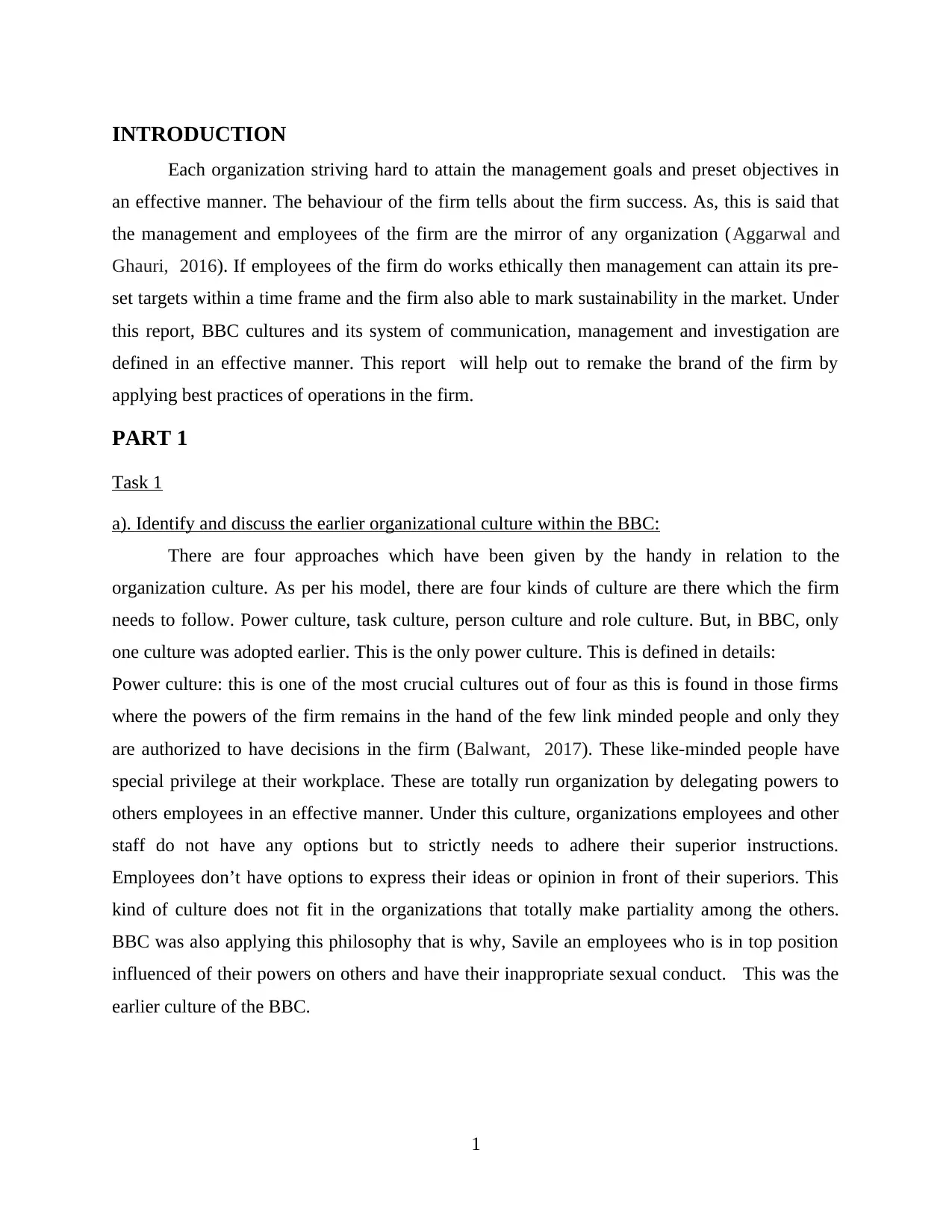
INTRODUCTION
Each organization striving hard to attain the management goals and preset objectives in
an effective manner. The behaviour of the firm tells about the firm success. As, this is said that
the management and employees of the firm are the mirror of any organization (Aggarwal and
Ghauri, 2016). If employees of the firm do works ethically then management can attain its pre-
set targets within a time frame and the firm also able to mark sustainability in the market. Under
this report, BBC cultures and its system of communication, management and investigation are
defined in an effective manner. This report will help out to remake the brand of the firm by
applying best practices of operations in the firm.
PART 1
Task 1
a). Identify and discuss the earlier organizational culture within the BBC:
There are four approaches which have been given by the handy in relation to the
organization culture. As per his model, there are four kinds of culture are there which the firm
needs to follow. Power culture, task culture, person culture and role culture. But, in BBC, only
one culture was adopted earlier. This is the only power culture. This is defined in details:
Power culture: this is one of the most crucial cultures out of four as this is found in those firms
where the powers of the firm remains in the hand of the few link minded people and only they
are authorized to have decisions in the firm (Balwant, 2017). These like-minded people have
special privilege at their workplace. These are totally run organization by delegating powers to
others employees in an effective manner. Under this culture, organizations employees and other
staff do not have any options but to strictly needs to adhere their superior instructions.
Employees don’t have options to express their ideas or opinion in front of their superiors. This
kind of culture does not fit in the organizations that totally make partiality among the others.
BBC was also applying this philosophy that is why, Savile an employees who is in top position
influenced of their powers on others and have their inappropriate sexual conduct. This was the
earlier culture of the BBC.
1
Each organization striving hard to attain the management goals and preset objectives in
an effective manner. The behaviour of the firm tells about the firm success. As, this is said that
the management and employees of the firm are the mirror of any organization (Aggarwal and
Ghauri, 2016). If employees of the firm do works ethically then management can attain its pre-
set targets within a time frame and the firm also able to mark sustainability in the market. Under
this report, BBC cultures and its system of communication, management and investigation are
defined in an effective manner. This report will help out to remake the brand of the firm by
applying best practices of operations in the firm.
PART 1
Task 1
a). Identify and discuss the earlier organizational culture within the BBC:
There are four approaches which have been given by the handy in relation to the
organization culture. As per his model, there are four kinds of culture are there which the firm
needs to follow. Power culture, task culture, person culture and role culture. But, in BBC, only
one culture was adopted earlier. This is the only power culture. This is defined in details:
Power culture: this is one of the most crucial cultures out of four as this is found in those firms
where the powers of the firm remains in the hand of the few link minded people and only they
are authorized to have decisions in the firm (Balwant, 2017). These like-minded people have
special privilege at their workplace. These are totally run organization by delegating powers to
others employees in an effective manner. Under this culture, organizations employees and other
staff do not have any options but to strictly needs to adhere their superior instructions.
Employees don’t have options to express their ideas or opinion in front of their superiors. This
kind of culture does not fit in the organizations that totally make partiality among the others.
BBC was also applying this philosophy that is why, Savile an employees who is in top position
influenced of their powers on others and have their inappropriate sexual conduct. This was the
earlier culture of the BBC.
1
⊘ This is a preview!⊘
Do you want full access?
Subscribe today to unlock all pages.

Trusted by 1+ million students worldwide
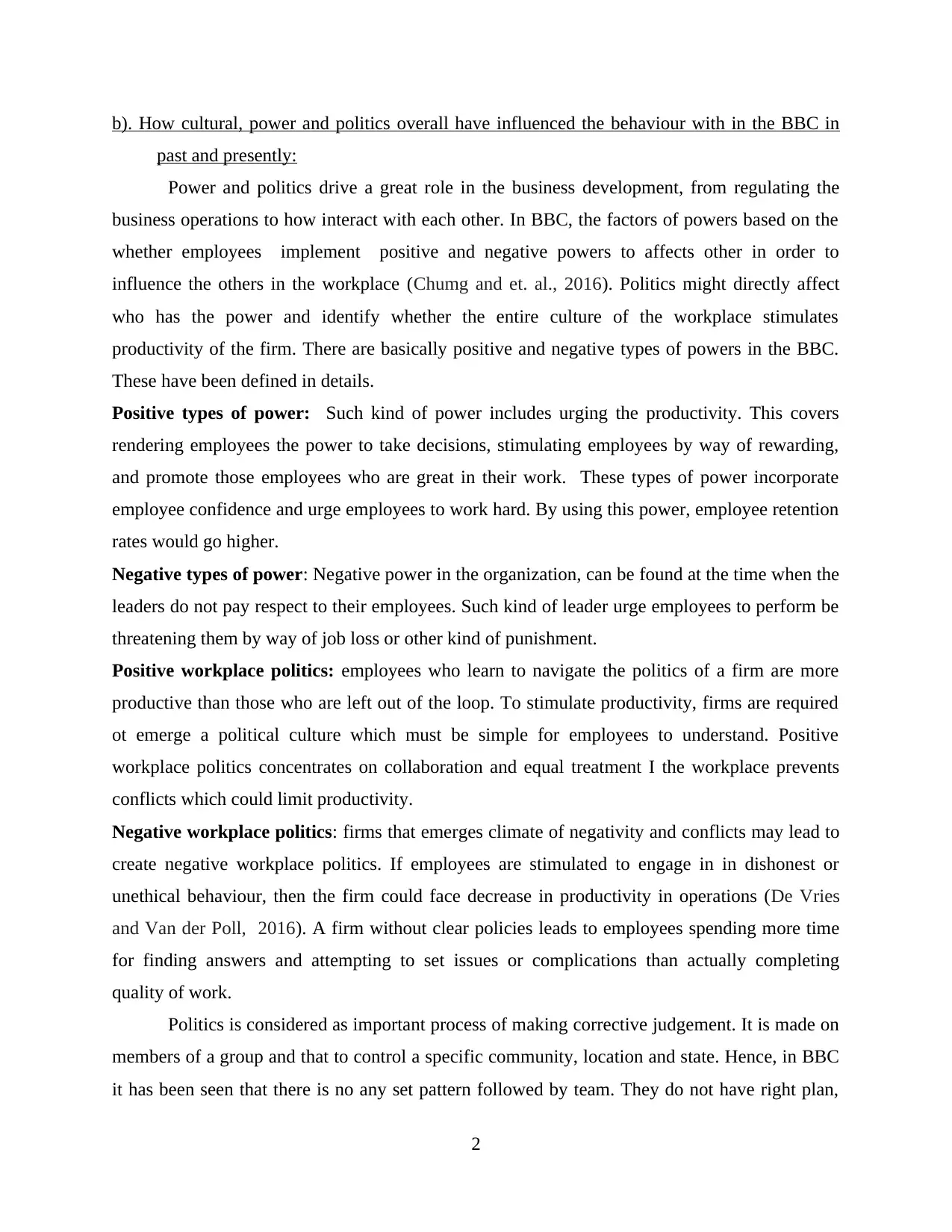
b). How cultural, power and politics overall have influenced the behaviour with in the BBC in
past and presently:
Power and politics drive a great role in the business development, from regulating the
business operations to how interact with each other. In BBC, the factors of powers based on the
whether employees implement positive and negative powers to affects other in order to
influence the others in the workplace (Chumg and et. al., 2016). Politics might directly affect
who has the power and identify whether the entire culture of the workplace stimulates
productivity of the firm. There are basically positive and negative types of powers in the BBC.
These have been defined in details.
Positive types of power: Such kind of power includes urging the productivity. This covers
rendering employees the power to take decisions, stimulating employees by way of rewarding,
and promote those employees who are great in their work. These types of power incorporate
employee confidence and urge employees to work hard. By using this power, employee retention
rates would go higher.
Negative types of power: Negative power in the organization, can be found at the time when the
leaders do not pay respect to their employees. Such kind of leader urge employees to perform be
threatening them by way of job loss or other kind of punishment.
Positive workplace politics: employees who learn to navigate the politics of a firm are more
productive than those who are left out of the loop. To stimulate productivity, firms are required
ot emerge a political culture which must be simple for employees to understand. Positive
workplace politics concentrates on collaboration and equal treatment I the workplace prevents
conflicts which could limit productivity.
Negative workplace politics: firms that emerges climate of negativity and conflicts may lead to
create negative workplace politics. If employees are stimulated to engage in in dishonest or
unethical behaviour, then the firm could face decrease in productivity in operations (De Vries
and Van der Poll, 2016). A firm without clear policies leads to employees spending more time
for finding answers and attempting to set issues or complications than actually completing
quality of work.
Politics is considered as important process of making corrective judgement. It is made on
members of a group and that to control a specific community, location and state. Hence, in BBC
it has been seen that there is no any set pattern followed by team. They do not have right plan,
2
past and presently:
Power and politics drive a great role in the business development, from regulating the
business operations to how interact with each other. In BBC, the factors of powers based on the
whether employees implement positive and negative powers to affects other in order to
influence the others in the workplace (Chumg and et. al., 2016). Politics might directly affect
who has the power and identify whether the entire culture of the workplace stimulates
productivity of the firm. There are basically positive and negative types of powers in the BBC.
These have been defined in details.
Positive types of power: Such kind of power includes urging the productivity. This covers
rendering employees the power to take decisions, stimulating employees by way of rewarding,
and promote those employees who are great in their work. These types of power incorporate
employee confidence and urge employees to work hard. By using this power, employee retention
rates would go higher.
Negative types of power: Negative power in the organization, can be found at the time when the
leaders do not pay respect to their employees. Such kind of leader urge employees to perform be
threatening them by way of job loss or other kind of punishment.
Positive workplace politics: employees who learn to navigate the politics of a firm are more
productive than those who are left out of the loop. To stimulate productivity, firms are required
ot emerge a political culture which must be simple for employees to understand. Positive
workplace politics concentrates on collaboration and equal treatment I the workplace prevents
conflicts which could limit productivity.
Negative workplace politics: firms that emerges climate of negativity and conflicts may lead to
create negative workplace politics. If employees are stimulated to engage in in dishonest or
unethical behaviour, then the firm could face decrease in productivity in operations (De Vries
and Van der Poll, 2016). A firm without clear policies leads to employees spending more time
for finding answers and attempting to set issues or complications than actually completing
quality of work.
Politics is considered as important process of making corrective judgement. It is made on
members of a group and that to control a specific community, location and state. Hence, in BBC
it has been seen that there is no any set pattern followed by team. They do not have right plan,
2
Paraphrase This Document
Need a fresh take? Get an instant paraphrase of this document with our AI Paraphraser
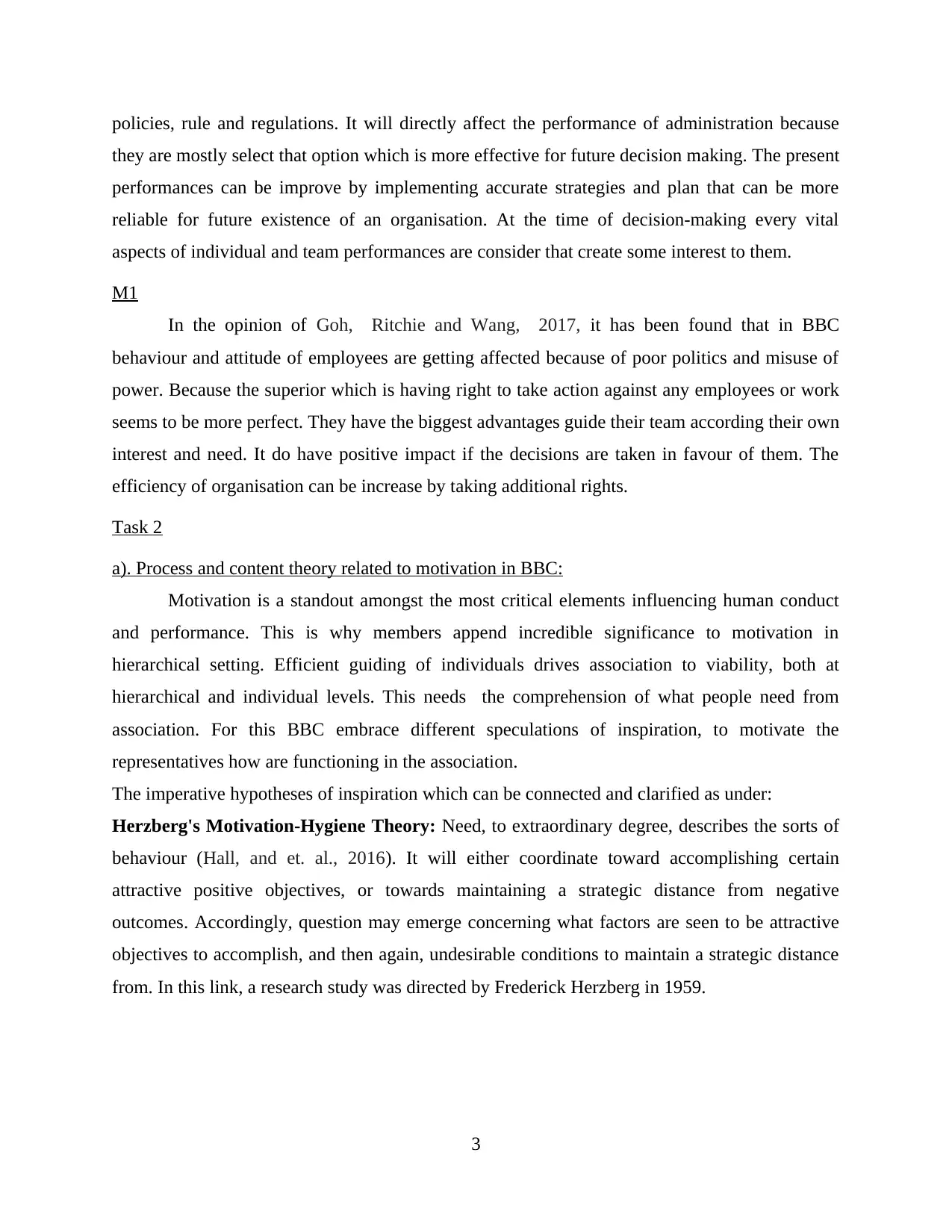
policies, rule and regulations. It will directly affect the performance of administration because
they are mostly select that option which is more effective for future decision making. The present
performances can be improve by implementing accurate strategies and plan that can be more
reliable for future existence of an organisation. At the time of decision-making every vital
aspects of individual and team performances are consider that create some interest to them.
M1
In the opinion of Goh, Ritchie and Wang, 2017, it has been found that in BBC
behaviour and attitude of employees are getting affected because of poor politics and misuse of
power. Because the superior which is having right to take action against any employees or work
seems to be more perfect. They have the biggest advantages guide their team according their own
interest and need. It do have positive impact if the decisions are taken in favour of them. The
efficiency of organisation can be increase by taking additional rights.
Task 2
a). Process and content theory related to motivation in BBC:
Motivation is a standout amongst the most critical elements influencing human conduct
and performance. This is why members append incredible significance to motivation in
hierarchical setting. Efficient guiding of individuals drives association to viability, both at
hierarchical and individual levels. This needs the comprehension of what people need from
association. For this BBC embrace different speculations of inspiration, to motivate the
representatives how are functioning in the association.
The imperative hypotheses of inspiration which can be connected and clarified as under:
Herzberg's Motivation-Hygiene Theory: Need, to extraordinary degree, describes the sorts of
behaviour (Hall, and et. al., 2016). It will either coordinate toward accomplishing certain
attractive positive objectives, or towards maintaining a strategic distance from negative
outcomes. Accordingly, question may emerge concerning what factors are seen to be attractive
objectives to accomplish, and then again, undesirable conditions to maintain a strategic distance
from. In this link, a research study was directed by Frederick Herzberg in 1959.
3
they are mostly select that option which is more effective for future decision making. The present
performances can be improve by implementing accurate strategies and plan that can be more
reliable for future existence of an organisation. At the time of decision-making every vital
aspects of individual and team performances are consider that create some interest to them.
M1
In the opinion of Goh, Ritchie and Wang, 2017, it has been found that in BBC
behaviour and attitude of employees are getting affected because of poor politics and misuse of
power. Because the superior which is having right to take action against any employees or work
seems to be more perfect. They have the biggest advantages guide their team according their own
interest and need. It do have positive impact if the decisions are taken in favour of them. The
efficiency of organisation can be increase by taking additional rights.
Task 2
a). Process and content theory related to motivation in BBC:
Motivation is a standout amongst the most critical elements influencing human conduct
and performance. This is why members append incredible significance to motivation in
hierarchical setting. Efficient guiding of individuals drives association to viability, both at
hierarchical and individual levels. This needs the comprehension of what people need from
association. For this BBC embrace different speculations of inspiration, to motivate the
representatives how are functioning in the association.
The imperative hypotheses of inspiration which can be connected and clarified as under:
Herzberg's Motivation-Hygiene Theory: Need, to extraordinary degree, describes the sorts of
behaviour (Hall, and et. al., 2016). It will either coordinate toward accomplishing certain
attractive positive objectives, or towards maintaining a strategic distance from negative
outcomes. Accordingly, question may emerge concerning what factors are seen to be attractive
objectives to accomplish, and then again, undesirable conditions to maintain a strategic distance
from. In this link, a research study was directed by Frederick Herzberg in 1959.
3
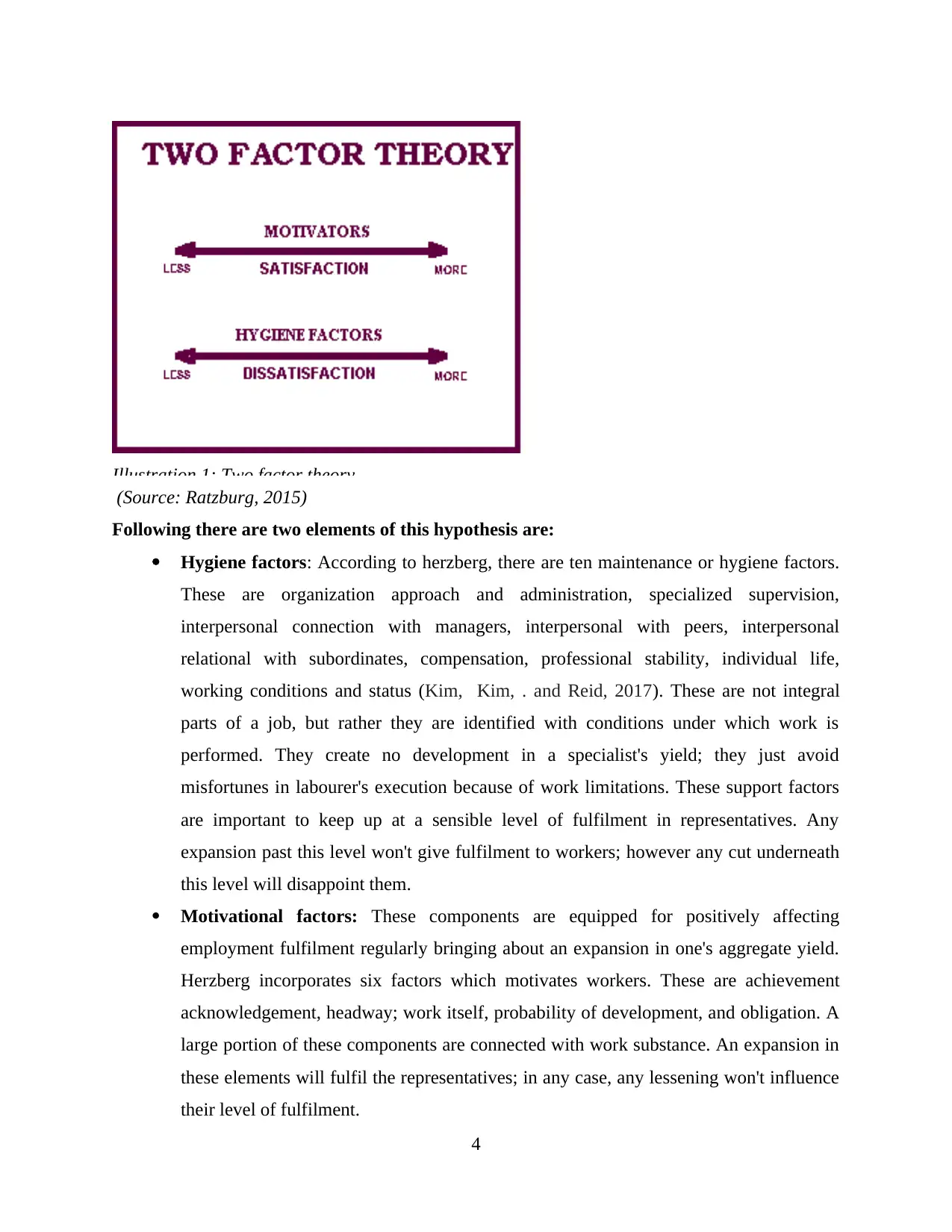
Illustration 1: Two factor theory
(Source: Ratzburg, 2015)
Following there are two elements of this hypothesis are:
Hygiene factors: According to herzberg, there are ten maintenance or hygiene factors.
These are organization approach and administration, specialized supervision,
interpersonal connection with managers, interpersonal with peers, interpersonal
relational with subordinates, compensation, professional stability, individual life,
working conditions and status (Kim, Kim, . and Reid, 2017). These are not integral
parts of a job, but rather they are identified with conditions under which work is
performed. They create no development in a specialist's yield; they just avoid
misfortunes in labourer's execution because of work limitations. These support factors
are important to keep up at a sensible level of fulfilment in representatives. Any
expansion past this level won't give fulfilment to workers; however any cut underneath
this level will disappoint them.
Motivational factors: These components are equipped for positively affecting
employment fulfilment regularly bringing about an expansion in one's aggregate yield.
Herzberg incorporates six factors which motivates workers. These are achievement
acknowledgement, headway; work itself, probability of development, and obligation. A
large portion of these components are connected with work substance. An expansion in
these elements will fulfil the representatives; in any case, any lessening won't influence
their level of fulfilment.
4
(Source: Ratzburg, 2015)
Following there are two elements of this hypothesis are:
Hygiene factors: According to herzberg, there are ten maintenance or hygiene factors.
These are organization approach and administration, specialized supervision,
interpersonal connection with managers, interpersonal with peers, interpersonal
relational with subordinates, compensation, professional stability, individual life,
working conditions and status (Kim, Kim, . and Reid, 2017). These are not integral
parts of a job, but rather they are identified with conditions under which work is
performed. They create no development in a specialist's yield; they just avoid
misfortunes in labourer's execution because of work limitations. These support factors
are important to keep up at a sensible level of fulfilment in representatives. Any
expansion past this level won't give fulfilment to workers; however any cut underneath
this level will disappoint them.
Motivational factors: These components are equipped for positively affecting
employment fulfilment regularly bringing about an expansion in one's aggregate yield.
Herzberg incorporates six factors which motivates workers. These are achievement
acknowledgement, headway; work itself, probability of development, and obligation. A
large portion of these components are connected with work substance. An expansion in
these elements will fulfil the representatives; in any case, any lessening won't influence
their level of fulfilment.
4
⊘ This is a preview!⊘
Do you want full access?
Subscribe today to unlock all pages.

Trusted by 1+ million students worldwide
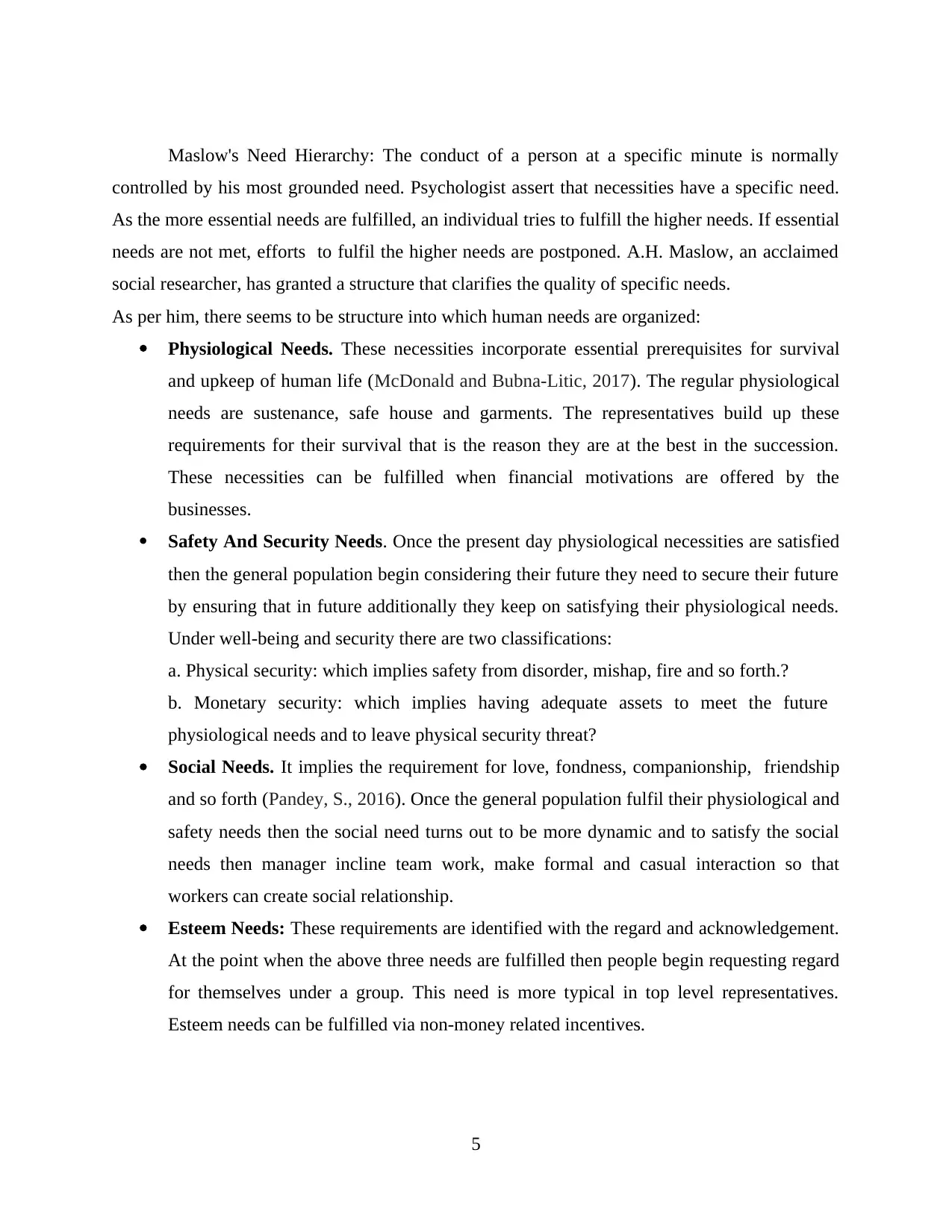
Maslow's Need Hierarchy: The conduct of a person at a specific minute is normally
controlled by his most grounded need. Psychologist assert that necessities have a specific need.
As the more essential needs are fulfilled, an individual tries to fulfill the higher needs. If essential
needs are not met, efforts to fulfil the higher needs are postponed. A.H. Maslow, an acclaimed
social researcher, has granted a structure that clarifies the quality of specific needs.
As per him, there seems to be structure into which human needs are organized:
Physiological Needs. These necessities incorporate essential prerequisites for survival
and upkeep of human life (McDonald and Bubna-Litic, 2017). The regular physiological
needs are sustenance, safe house and garments. The representatives build up these
requirements for their survival that is the reason they are at the best in the succession.
These necessities can be fulfilled when financial motivations are offered by the
businesses.
Safety And Security Needs. Once the present day physiological necessities are satisfied
then the general population begin considering their future they need to secure their future
by ensuring that in future additionally they keep on satisfying their physiological needs.
Under well-being and security there are two classifications:
a. Physical security: which implies safety from disorder, mishap, fire and so forth.?
b. Monetary security: which implies having adequate assets to meet the future
physiological needs and to leave physical security threat?
Social Needs. It implies the requirement for love, fondness, companionship, friendship
and so forth (Pandey, S., 2016). Once the general population fulfil their physiological and
safety needs then the social need turns out to be more dynamic and to satisfy the social
needs then manager incline team work, make formal and casual interaction so that
workers can create social relationship.
Esteem Needs: These requirements are identified with the regard and acknowledgement.
At the point when the above three needs are fulfilled then people begin requesting regard
for themselves under a group. This need is more typical in top level representatives.
Esteem needs can be fulfilled via non-money related incentives.
5
controlled by his most grounded need. Psychologist assert that necessities have a specific need.
As the more essential needs are fulfilled, an individual tries to fulfill the higher needs. If essential
needs are not met, efforts to fulfil the higher needs are postponed. A.H. Maslow, an acclaimed
social researcher, has granted a structure that clarifies the quality of specific needs.
As per him, there seems to be structure into which human needs are organized:
Physiological Needs. These necessities incorporate essential prerequisites for survival
and upkeep of human life (McDonald and Bubna-Litic, 2017). The regular physiological
needs are sustenance, safe house and garments. The representatives build up these
requirements for their survival that is the reason they are at the best in the succession.
These necessities can be fulfilled when financial motivations are offered by the
businesses.
Safety And Security Needs. Once the present day physiological necessities are satisfied
then the general population begin considering their future they need to secure their future
by ensuring that in future additionally they keep on satisfying their physiological needs.
Under well-being and security there are two classifications:
a. Physical security: which implies safety from disorder, mishap, fire and so forth.?
b. Monetary security: which implies having adequate assets to meet the future
physiological needs and to leave physical security threat?
Social Needs. It implies the requirement for love, fondness, companionship, friendship
and so forth (Pandey, S., 2016). Once the general population fulfil their physiological and
safety needs then the social need turns out to be more dynamic and to satisfy the social
needs then manager incline team work, make formal and casual interaction so that
workers can create social relationship.
Esteem Needs: These requirements are identified with the regard and acknowledgement.
At the point when the above three needs are fulfilled then people begin requesting regard
for themselves under a group. This need is more typical in top level representatives.
Esteem needs can be fulfilled via non-money related incentives.
5
Paraphrase This Document
Need a fresh take? Get an instant paraphrase of this document with our AI Paraphraser
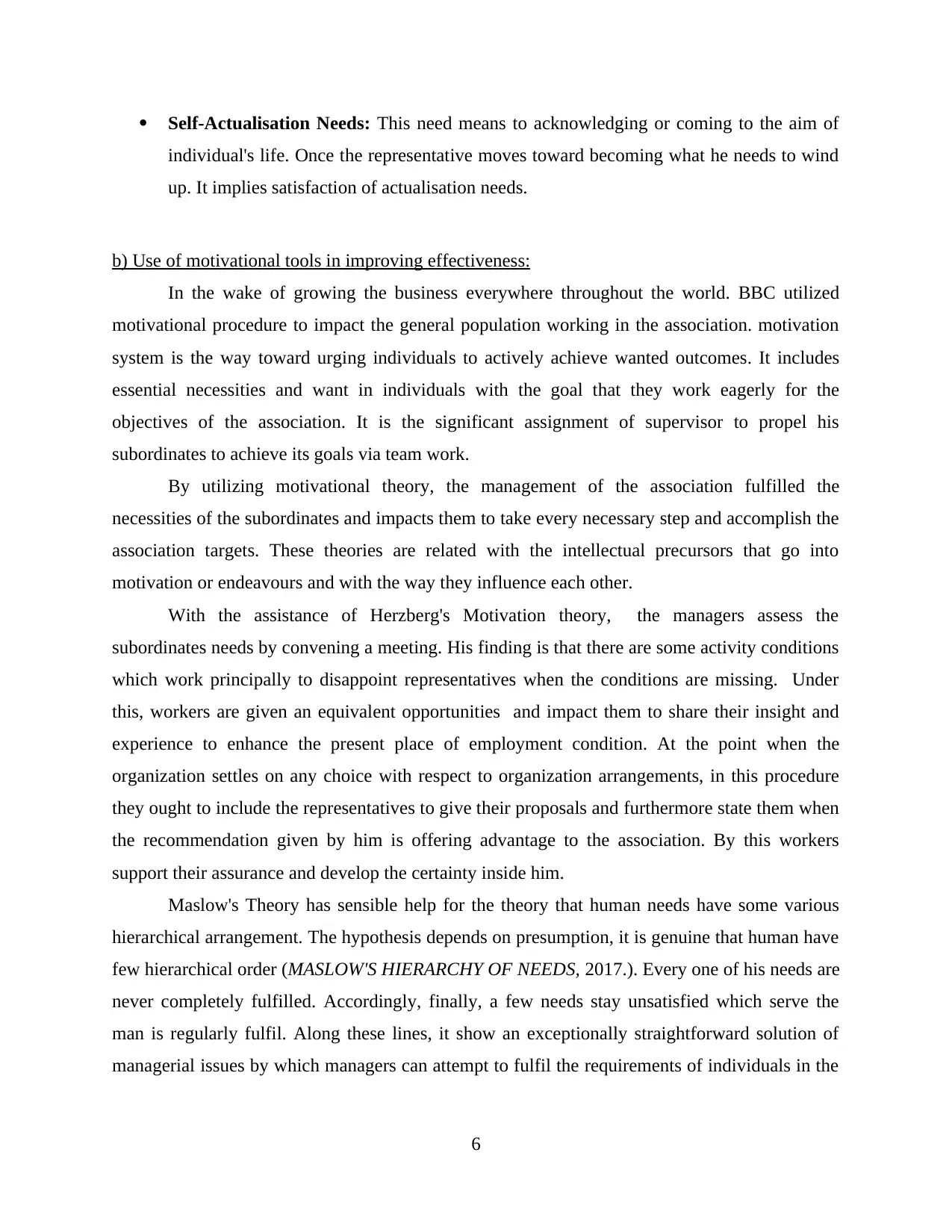
Self-Actualisation Needs: This need means to acknowledging or coming to the aim of
individual's life. Once the representative moves toward becoming what he needs to wind
up. It implies satisfaction of actualisation needs.
b) Use of motivational tools in improving effectiveness:
In the wake of growing the business everywhere throughout the world. BBC utilized
motivational procedure to impact the general population working in the association. motivation
system is the way toward urging individuals to actively achieve wanted outcomes. It includes
essential necessities and want in individuals with the goal that they work eagerly for the
objectives of the association. It is the significant assignment of supervisor to propel his
subordinates to achieve its goals via team work.
By utilizing motivational theory, the management of the association fulfilled the
necessities of the subordinates and impacts them to take every necessary step and accomplish the
association targets. These theories are related with the intellectual precursors that go into
motivation or endeavours and with the way they influence each other.
With the assistance of Herzberg's Motivation theory, the managers assess the
subordinates needs by convening a meeting. His finding is that there are some activity conditions
which work principally to disappoint representatives when the conditions are missing. Under
this, workers are given an equivalent opportunities and impact them to share their insight and
experience to enhance the present place of employment condition. At the point when the
organization settles on any choice with respect to organization arrangements, in this procedure
they ought to include the representatives to give their proposals and furthermore state them when
the recommendation given by him is offering advantage to the association. By this workers
support their assurance and develop the certainty inside him.
Maslow's Theory has sensible help for the theory that human needs have some various
hierarchical arrangement. The hypothesis depends on presumption, it is genuine that human have
few hierarchical order (MASLOW'S HIERARCHY OF NEEDS, 2017.). Every one of his needs are
never completely fulfilled. Accordingly, finally, a few needs stay unsatisfied which serve the
man is regularly fulfil. Along these lines, it show an exceptionally straightforward solution of
managerial issues by which managers can attempt to fulfil the requirements of individuals in the
6
individual's life. Once the representative moves toward becoming what he needs to wind
up. It implies satisfaction of actualisation needs.
b) Use of motivational tools in improving effectiveness:
In the wake of growing the business everywhere throughout the world. BBC utilized
motivational procedure to impact the general population working in the association. motivation
system is the way toward urging individuals to actively achieve wanted outcomes. It includes
essential necessities and want in individuals with the goal that they work eagerly for the
objectives of the association. It is the significant assignment of supervisor to propel his
subordinates to achieve its goals via team work.
By utilizing motivational theory, the management of the association fulfilled the
necessities of the subordinates and impacts them to take every necessary step and accomplish the
association targets. These theories are related with the intellectual precursors that go into
motivation or endeavours and with the way they influence each other.
With the assistance of Herzberg's Motivation theory, the managers assess the
subordinates needs by convening a meeting. His finding is that there are some activity conditions
which work principally to disappoint representatives when the conditions are missing. Under
this, workers are given an equivalent opportunities and impact them to share their insight and
experience to enhance the present place of employment condition. At the point when the
organization settles on any choice with respect to organization arrangements, in this procedure
they ought to include the representatives to give their proposals and furthermore state them when
the recommendation given by him is offering advantage to the association. By this workers
support their assurance and develop the certainty inside him.
Maslow's Theory has sensible help for the theory that human needs have some various
hierarchical arrangement. The hypothesis depends on presumption, it is genuine that human have
few hierarchical order (MASLOW'S HIERARCHY OF NEEDS, 2017.). Every one of his needs are
never completely fulfilled. Accordingly, finally, a few needs stay unsatisfied which serve the
man is regularly fulfil. Along these lines, it show an exceptionally straightforward solution of
managerial issues by which managers can attempt to fulfil the requirements of individuals in the
6
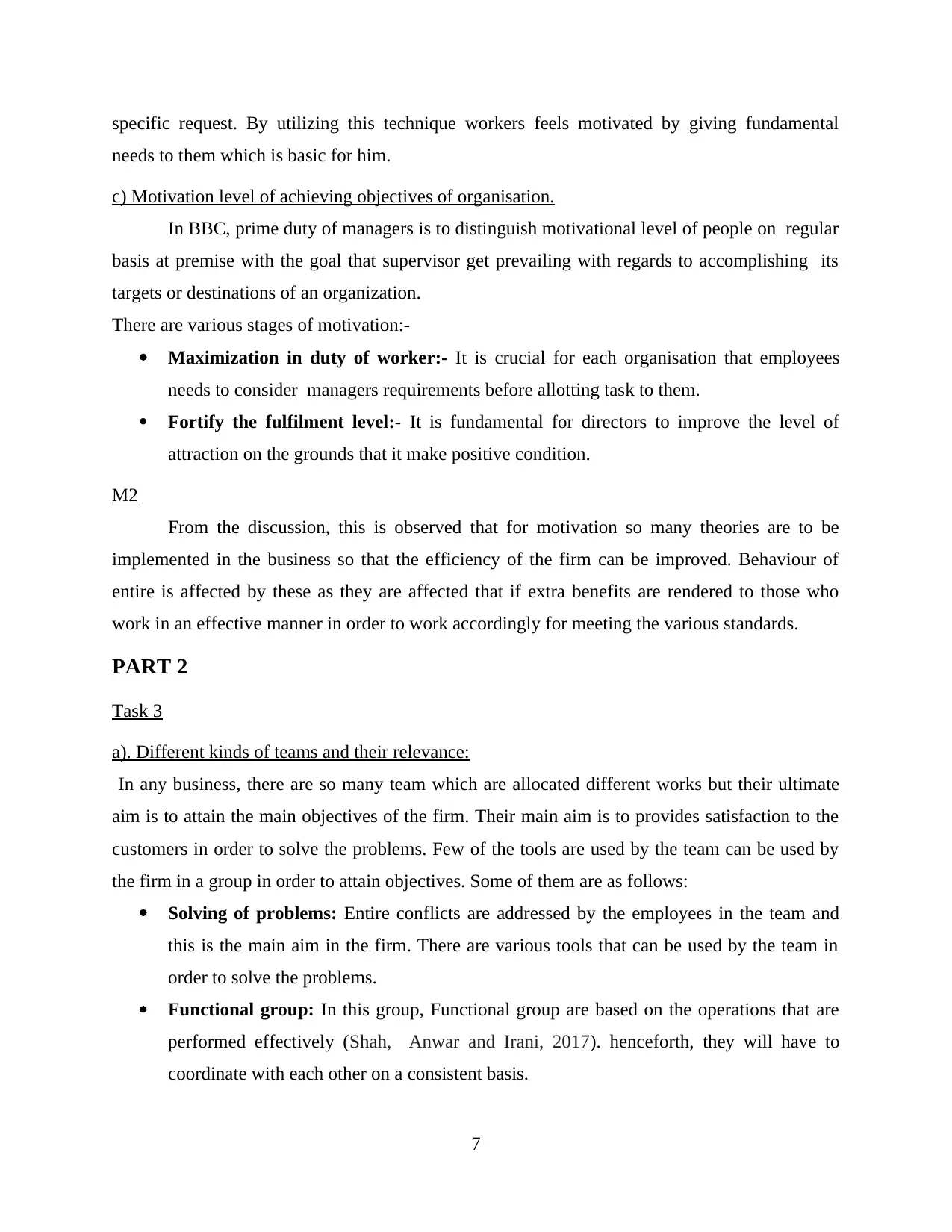
specific request. By utilizing this technique workers feels motivated by giving fundamental
needs to them which is basic for him.
c) Motivation level of achieving objectives of organisation.
In BBC, prime duty of managers is to distinguish motivational level of people on regular
basis at premise with the goal that supervisor get prevailing with regards to accomplishing its
targets or destinations of an organization.
There are various stages of motivation:-
Maximization in duty of worker:- It is crucial for each organisation that employees
needs to consider managers requirements before allotting task to them.
Fortify the fulfilment level:- It is fundamental for directors to improve the level of
attraction on the grounds that it make positive condition.
M2
From the discussion, this is observed that for motivation so many theories are to be
implemented in the business so that the efficiency of the firm can be improved. Behaviour of
entire is affected by these as they are affected that if extra benefits are rendered to those who
work in an effective manner in order to work accordingly for meeting the various standards.
PART 2
Task 3
a). Different kinds of teams and their relevance:
In any business, there are so many team which are allocated different works but their ultimate
aim is to attain the main objectives of the firm. Their main aim is to provides satisfaction to the
customers in order to solve the problems. Few of the tools are used by the team can be used by
the firm in a group in order to attain objectives. Some of them are as follows:
Solving of problems: Entire conflicts are addressed by the employees in the team and
this is the main aim in the firm. There are various tools that can be used by the team in
order to solve the problems.
Functional group: In this group, Functional group are based on the operations that are
performed effectively (Shah, Anwar and Irani, 2017). henceforth, they will have to
coordinate with each other on a consistent basis.
7
needs to them which is basic for him.
c) Motivation level of achieving objectives of organisation.
In BBC, prime duty of managers is to distinguish motivational level of people on regular
basis at premise with the goal that supervisor get prevailing with regards to accomplishing its
targets or destinations of an organization.
There are various stages of motivation:-
Maximization in duty of worker:- It is crucial for each organisation that employees
needs to consider managers requirements before allotting task to them.
Fortify the fulfilment level:- It is fundamental for directors to improve the level of
attraction on the grounds that it make positive condition.
M2
From the discussion, this is observed that for motivation so many theories are to be
implemented in the business so that the efficiency of the firm can be improved. Behaviour of
entire is affected by these as they are affected that if extra benefits are rendered to those who
work in an effective manner in order to work accordingly for meeting the various standards.
PART 2
Task 3
a). Different kinds of teams and their relevance:
In any business, there are so many team which are allocated different works but their ultimate
aim is to attain the main objectives of the firm. Their main aim is to provides satisfaction to the
customers in order to solve the problems. Few of the tools are used by the team can be used by
the firm in a group in order to attain objectives. Some of them are as follows:
Solving of problems: Entire conflicts are addressed by the employees in the team and
this is the main aim in the firm. There are various tools that can be used by the team in
order to solve the problems.
Functional group: In this group, Functional group are based on the operations that are
performed effectively (Shah, Anwar and Irani, 2017). henceforth, they will have to
coordinate with each other on a consistent basis.
7
⊘ This is a preview!⊘
Do you want full access?
Subscribe today to unlock all pages.

Trusted by 1+ million students worldwide
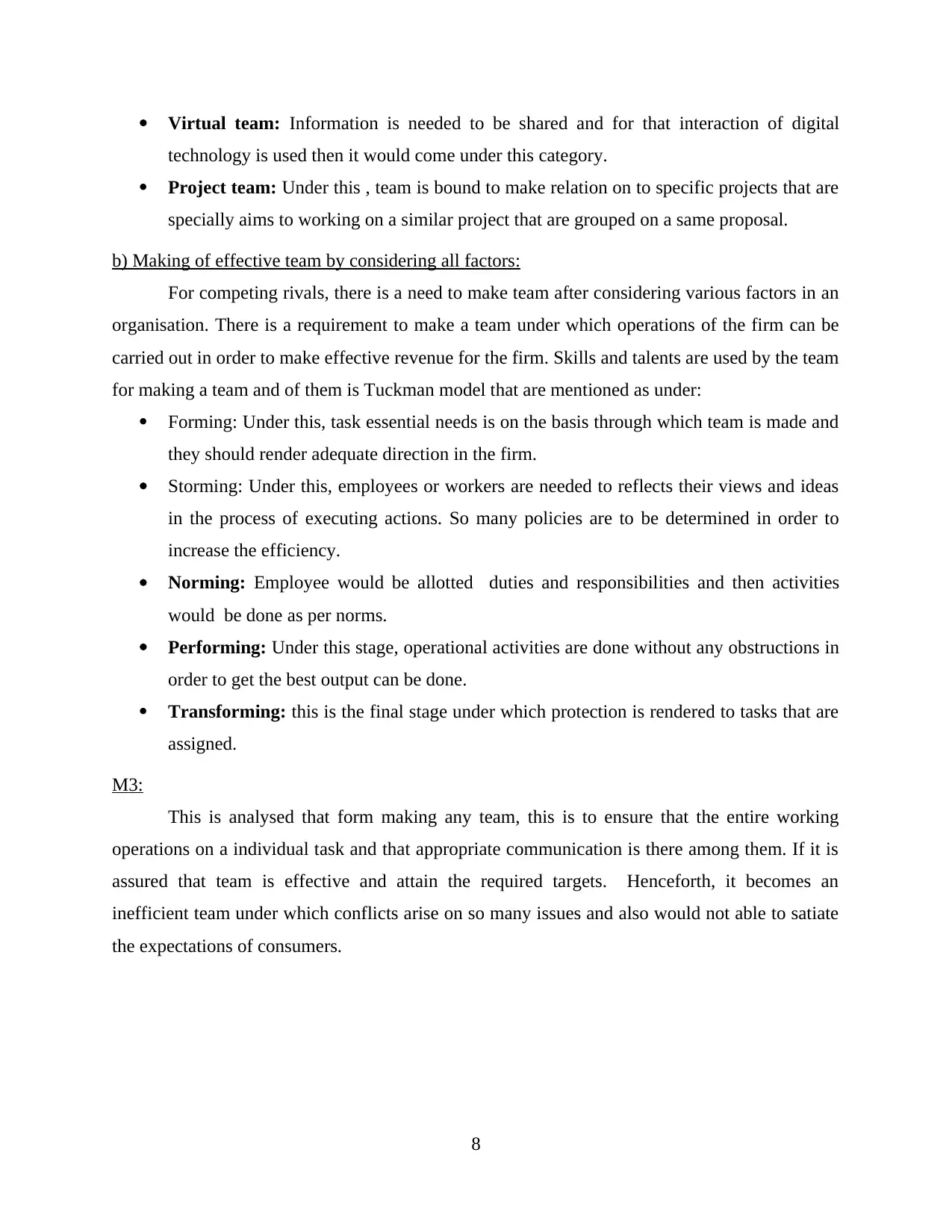
Virtual team: Information is needed to be shared and for that interaction of digital
technology is used then it would come under this category.
Project team: Under this , team is bound to make relation on to specific projects that are
specially aims to working on a similar project that are grouped on a same proposal.
b) Making of effective team by considering all factors:
For competing rivals, there is a need to make team after considering various factors in an
organisation. There is a requirement to make a team under which operations of the firm can be
carried out in order to make effective revenue for the firm. Skills and talents are used by the team
for making a team and of them is Tuckman model that are mentioned as under:
Forming: Under this, task essential needs is on the basis through which team is made and
they should render adequate direction in the firm.
Storming: Under this, employees or workers are needed to reflects their views and ideas
in the process of executing actions. So many policies are to be determined in order to
increase the efficiency.
Norming: Employee would be allotted duties and responsibilities and then activities
would be done as per norms.
Performing: Under this stage, operational activities are done without any obstructions in
order to get the best output can be done.
Transforming: this is the final stage under which protection is rendered to tasks that are
assigned.
M3:
This is analysed that form making any team, this is to ensure that the entire working
operations on a individual task and that appropriate communication is there among them. If it is
assured that team is effective and attain the required targets. Henceforth, it becomes an
inefficient team under which conflicts arise on so many issues and also would not able to satiate
the expectations of consumers.
8
technology is used then it would come under this category.
Project team: Under this , team is bound to make relation on to specific projects that are
specially aims to working on a similar project that are grouped on a same proposal.
b) Making of effective team by considering all factors:
For competing rivals, there is a need to make team after considering various factors in an
organisation. There is a requirement to make a team under which operations of the firm can be
carried out in order to make effective revenue for the firm. Skills and talents are used by the team
for making a team and of them is Tuckman model that are mentioned as under:
Forming: Under this, task essential needs is on the basis through which team is made and
they should render adequate direction in the firm.
Storming: Under this, employees or workers are needed to reflects their views and ideas
in the process of executing actions. So many policies are to be determined in order to
increase the efficiency.
Norming: Employee would be allotted duties and responsibilities and then activities
would be done as per norms.
Performing: Under this stage, operational activities are done without any obstructions in
order to get the best output can be done.
Transforming: this is the final stage under which protection is rendered to tasks that are
assigned.
M3:
This is analysed that form making any team, this is to ensure that the entire working
operations on a individual task and that appropriate communication is there among them. If it is
assured that team is effective and attain the required targets. Henceforth, it becomes an
inefficient team under which conflicts arise on so many issues and also would not able to satiate
the expectations of consumers.
8
Paraphrase This Document
Need a fresh take? Get an instant paraphrase of this document with our AI Paraphraser
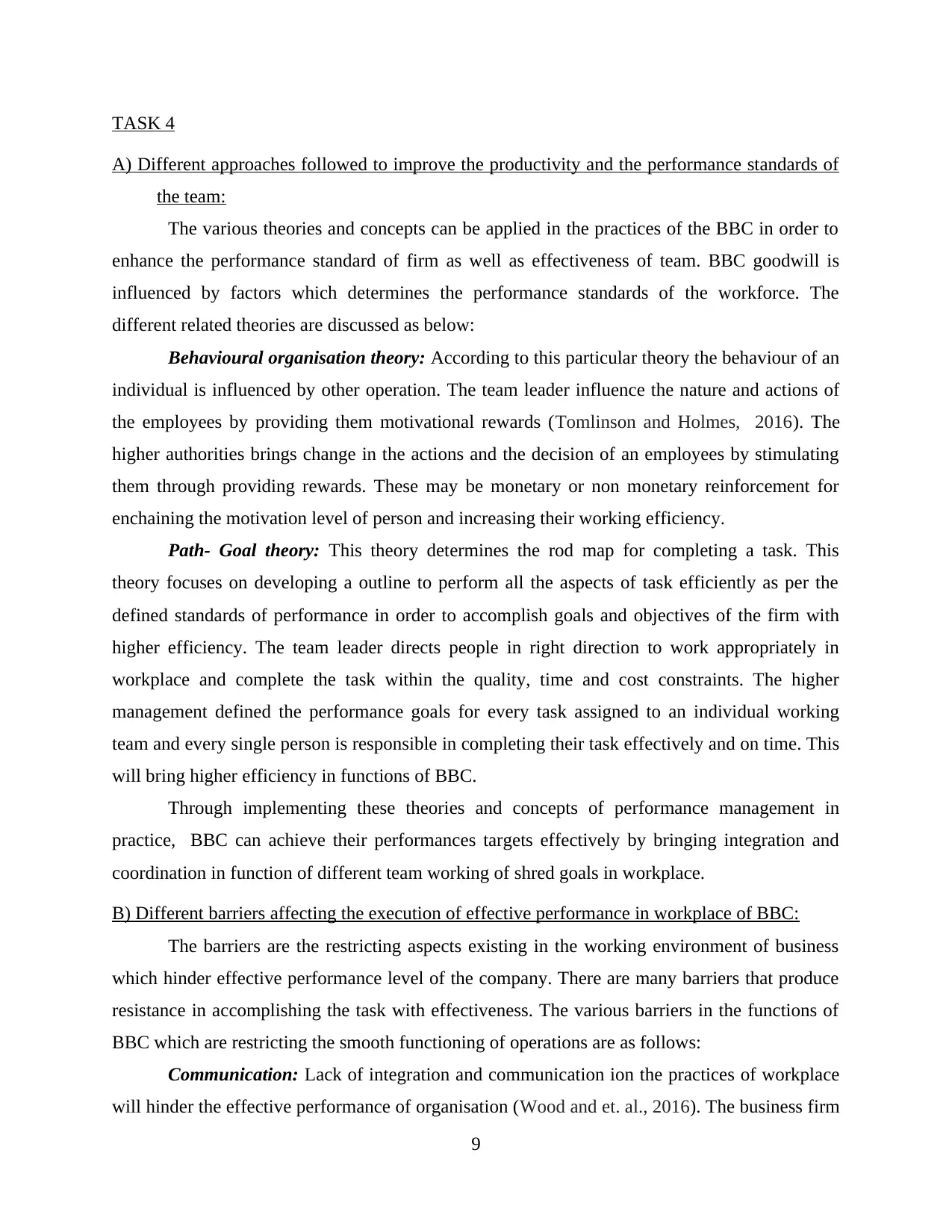
TASK 4
A) Different approaches followed to improve the productivity and the performance standards of
the team:
The various theories and concepts can be applied in the practices of the BBC in order to
enhance the performance standard of firm as well as effectiveness of team. BBC goodwill is
influenced by factors which determines the performance standards of the workforce. The
different related theories are discussed as below:
Behavioural organisation theory: According to this particular theory the behaviour of an
individual is influenced by other operation. The team leader influence the nature and actions of
the employees by providing them motivational rewards (Tomlinson and Holmes, 2016). The
higher authorities brings change in the actions and the decision of an employees by stimulating
them through providing rewards. These may be monetary or non monetary reinforcement for
enchaining the motivation level of person and increasing their working efficiency.
Path- Goal theory: This theory determines the rod map for completing a task. This
theory focuses on developing a outline to perform all the aspects of task efficiently as per the
defined standards of performance in order to accomplish goals and objectives of the firm with
higher efficiency. The team leader directs people in right direction to work appropriately in
workplace and complete the task within the quality, time and cost constraints. The higher
management defined the performance goals for every task assigned to an individual working
team and every single person is responsible in completing their task effectively and on time. This
will bring higher efficiency in functions of BBC.
Through implementing these theories and concepts of performance management in
practice, BBC can achieve their performances targets effectively by bringing integration and
coordination in function of different team working of shred goals in workplace.
B) Different barriers affecting the execution of effective performance in workplace of BBC:
The barriers are the restricting aspects existing in the working environment of business
which hinder effective performance level of the company. There are many barriers that produce
resistance in accomplishing the task with effectiveness. The various barriers in the functions of
BBC which are restricting the smooth functioning of operations are as follows:
Communication: Lack of integration and communication ion the practices of workplace
will hinder the effective performance of organisation (Wood and et. al., 2016). The business firm
9
A) Different approaches followed to improve the productivity and the performance standards of
the team:
The various theories and concepts can be applied in the practices of the BBC in order to
enhance the performance standard of firm as well as effectiveness of team. BBC goodwill is
influenced by factors which determines the performance standards of the workforce. The
different related theories are discussed as below:
Behavioural organisation theory: According to this particular theory the behaviour of an
individual is influenced by other operation. The team leader influence the nature and actions of
the employees by providing them motivational rewards (Tomlinson and Holmes, 2016). The
higher authorities brings change in the actions and the decision of an employees by stimulating
them through providing rewards. These may be monetary or non monetary reinforcement for
enchaining the motivation level of person and increasing their working efficiency.
Path- Goal theory: This theory determines the rod map for completing a task. This
theory focuses on developing a outline to perform all the aspects of task efficiently as per the
defined standards of performance in order to accomplish goals and objectives of the firm with
higher efficiency. The team leader directs people in right direction to work appropriately in
workplace and complete the task within the quality, time and cost constraints. The higher
management defined the performance goals for every task assigned to an individual working
team and every single person is responsible in completing their task effectively and on time. This
will bring higher efficiency in functions of BBC.
Through implementing these theories and concepts of performance management in
practice, BBC can achieve their performances targets effectively by bringing integration and
coordination in function of different team working of shred goals in workplace.
B) Different barriers affecting the execution of effective performance in workplace of BBC:
The barriers are the restricting aspects existing in the working environment of business
which hinder effective performance level of the company. There are many barriers that produce
resistance in accomplishing the task with effectiveness. The various barriers in the functions of
BBC which are restricting the smooth functioning of operations are as follows:
Communication: Lack of integration and communication ion the practices of workplace
will hinder the effective performance of organisation (Wood and et. al., 2016). The business firm
9
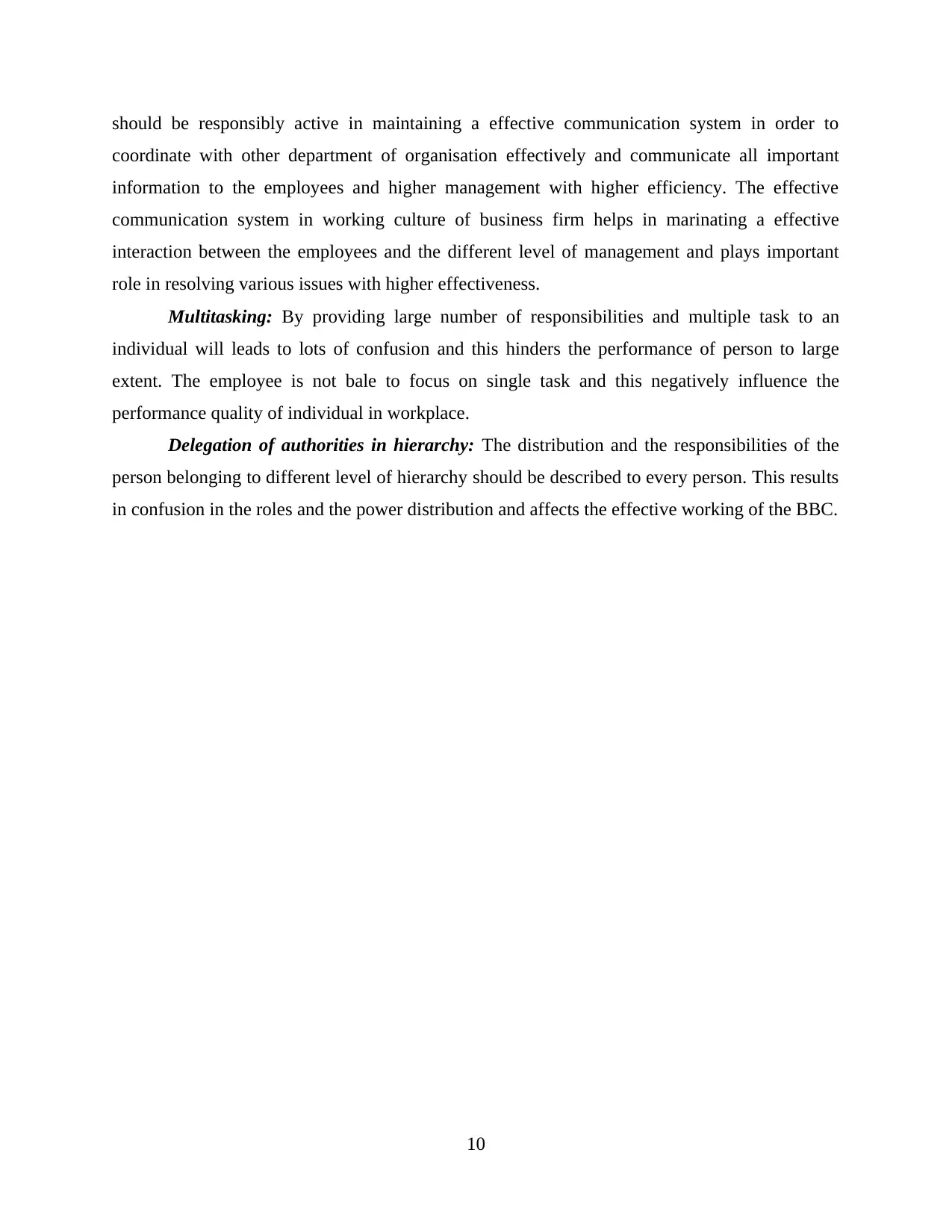
should be responsibly active in maintaining a effective communication system in order to
coordinate with other department of organisation effectively and communicate all important
information to the employees and higher management with higher efficiency. The effective
communication system in working culture of business firm helps in marinating a effective
interaction between the employees and the different level of management and plays important
role in resolving various issues with higher effectiveness.
Multitasking: By providing large number of responsibilities and multiple task to an
individual will leads to lots of confusion and this hinders the performance of person to large
extent. The employee is not bale to focus on single task and this negatively influence the
performance quality of individual in workplace.
Delegation of authorities in hierarchy: The distribution and the responsibilities of the
person belonging to different level of hierarchy should be described to every person. This results
in confusion in the roles and the power distribution and affects the effective working of the BBC.
10
coordinate with other department of organisation effectively and communicate all important
information to the employees and higher management with higher efficiency. The effective
communication system in working culture of business firm helps in marinating a effective
interaction between the employees and the different level of management and plays important
role in resolving various issues with higher effectiveness.
Multitasking: By providing large number of responsibilities and multiple task to an
individual will leads to lots of confusion and this hinders the performance of person to large
extent. The employee is not bale to focus on single task and this negatively influence the
performance quality of individual in workplace.
Delegation of authorities in hierarchy: The distribution and the responsibilities of the
person belonging to different level of hierarchy should be described to every person. This results
in confusion in the roles and the power distribution and affects the effective working of the BBC.
10
⊘ This is a preview!⊘
Do you want full access?
Subscribe today to unlock all pages.

Trusted by 1+ million students worldwide
1 out of 14
Related Documents
Your All-in-One AI-Powered Toolkit for Academic Success.
+13062052269
info@desklib.com
Available 24*7 on WhatsApp / Email
![[object Object]](/_next/static/media/star-bottom.7253800d.svg)
Unlock your academic potential
Copyright © 2020–2026 A2Z Services. All Rights Reserved. Developed and managed by ZUCOL.





